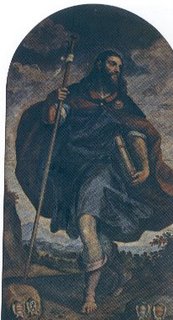 The Spanish Bishops have come up with a pastoral instruction about the Church in Spain being sick. This is sad news seeing that my country was Christianized by Spain and I came from a monastery established by Spanish monks from Barcelona, Spain.
The Spanish Bishops have come up with a pastoral instruction about the Church in Spain being sick. This is sad news seeing that my country was Christianized by Spain and I came from a monastery established by Spanish monks from Barcelona, Spain.I was bewildered by the fact that most of my country's national heroes were members of a secret society which they joined while they were in Spain between the 18th and 19th hundreds. They did much to discredit the Catholic Church here in the Philippines in the tradition of Victor Hugo.
Many of my co- seminarians then had relatives during the last civil war in Spain under Franco against the communists. It seems Catholicism was already sick that early in Spain, though I was impressed by the number of young Spaniards going to foreign missions at that time. But now vocations are rare.
If we put this news side by side with a previous blog on Pope Benedict and the Religious Superiors, both refer to the same crisis in the Church. I have been reading of this crisis as a young seminarian but never figured out what it was all about. Now Canada seems to be in the same boat, and the bishops there can expect a lashing from the Pope for having failed to evangelized the Catholics there. It's like saying that they have failed to teach the people how to become Catholics.
As a young priest, I was appointed Chairman of the Catechetical section of the Association of Catholic schools in the country. I noticed the dismal state of the catechetical instruction and procured the help of the Jesuits recently kicked out of China to help out. Some of them were Spaniards who did a great job helping out with their Kerygmatic approach.
Assigned to a Diocese, I noticed the weird theologies of most parish priests so I offered to produce a newsletter on Patristic spirituality for the Parish priests. This newsletter was in the tradition of St. Thomas of Aquinas' Catena Aurea.
Four years ago, like the Spanish Bishops, our Bishops' Conference here noticed the dismal state of the training of seminarians in spirituality and requested for a curriculum which we obliged to make for them. They readily approved it but until now it could not be implemented. Reason: the seminary professors were not prepared to teach Patristic Spirituality.
Add to these the great divorce that took place within the Church around the 14th century and we see the picture which the Spanish Bishops saw. A sight which our present Pope also saw as head of the Congregation working at that time in conjuction with the Spanish Bishops.
The condition seems to be worldwide and not only in Spain and Canada. The pastoral instruction will be presented as a working model for the world and will be printed in L'Osservatore Romano. In Italy it has already been printed in 'Il Regno.'
The document list a number of errors against numerous Catholic Doctrines. The list of errors and their corresponding refutation is difficult reading for many. For most of us who have a simpler understanding, it would be easier if we just find out what are the Catholic teachings without going through the errors. And the Compendium of Pope Benedict XVI is there to teach us just that.
But note the problem: loss of faith, poor instructors, and progressive theologians. In any case the Compendium would be a good beginning; " Deus Caritas Est" would be quite advanced. But the bigger problem is how to lead souls into attaining the theological virtue of Faith. Now that is a case of teaching asceticism, a subject which is now non-existent in most seminaries.
So how can we expect priests to teach what they do not know; and how can we expect people to have faith when they have not been instructed?
The document has listed down the modern errors; and it has clarified once more what is Truth. But if presented to the Catholic world, it might ask "What is truth?" Sounds familiar? Now that is the real problem. The world could again crucify the Truth. (Painting is "St. James the Great." by Palma Il Giovane, 16th century, greatly venerated in Compostela, Spain.)